Echoes of life in a ‘deserted’ village
A collection of mediaeval deeds relating to the now deserted villages of Wyham and Cadeby in Lincolnshire forms part of the papers of John, 1st Viscount Welles, which have now been arranged and described in the online catalogue of St John’s institutional archives. These descriptions can be read online at https://www.sjcarchives.org.uk/institutional/index.php/john-lord-welles
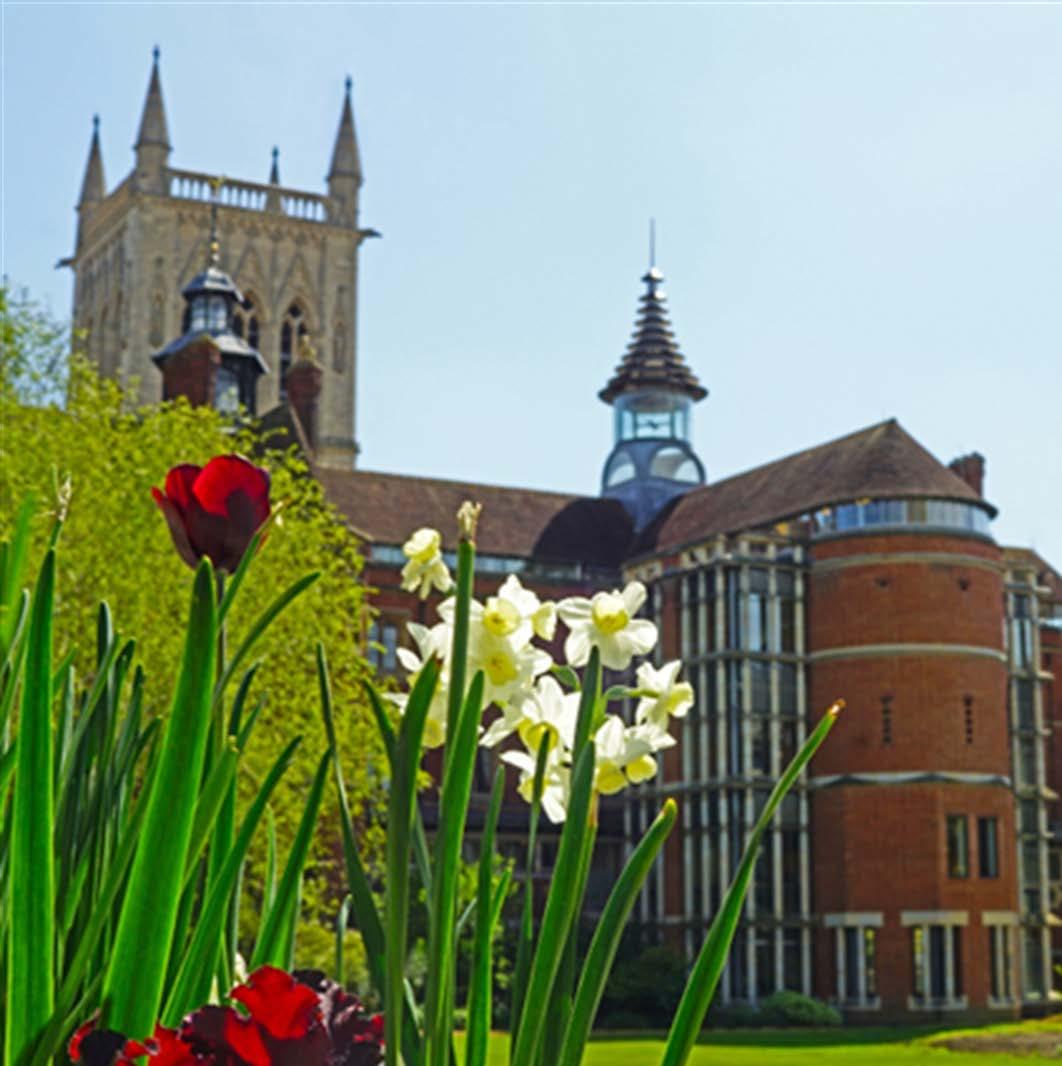
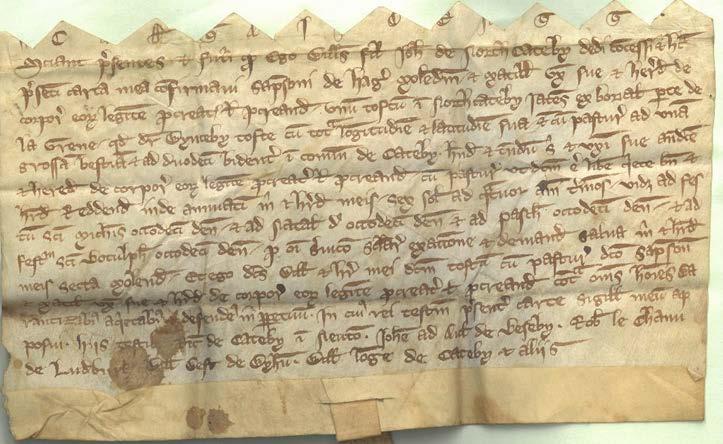
John Welles was half-brother to Lady Margaret Beaufort and appointed her one of the overseers of his will, along with the King and Queen. A copy of his first will survives in the College archives along with a small number of other family documents, such as a licence of the Bishop of Lincoln for John’s wife, Cecily of York, to hold private masses throughout the diocese of Lincoln. The bulk of the collection, however, concerns estates in Lincolnshire which had first been granted to Viscount Welles’ great-greatgrandfather, Adam, in 1357. The estates never belonged to St John’s College and the presence of these documents in the archives must be attributed to Lady Margaret and her intervention with the King in 1502-3 on Cecily’s behalf when he took the estates into his own possession after Cecily remarried without royal permission. The papers have therefore been catalogued with Lady Margaret’s papers, rather than with Estate papers in the College Records.
The deeds surviving in the College archives are those of Manby and its appurtenances, including Cadeby, Wyham, and Little Grimsby. The records of Wyham and Cadeby mostly date from c. 1200 to 1387, with one additional document dated 1473. This last shows a landowner agreeing to take a reduced payment for the 16 years of rent arrears owed him on land and a meadow in a field in North Cadeby. In the earlier deeds, we see a wider range of characters, including Sampson the miller and Matilda his wife, who rented a toft from William, son of John of
St John’s C olle g e Li b r a r y N e w s l e t t er L
Easter 2024
VOLUME 7, ISSUE 3
North Cadeby, and in 1307 also rented a windmill from him, in payment for which they owed an annual tithe to the church of North Cadeby, six quarters of wheat to the grantor, and grinding of his corn without charge.
Although a (deconsecrated) church survives at Wyham, and Cadeby and Wyham each have a post-mediaeval large country house, the villages themselves have gone: Historic England research records on the Heritage Gateway website describe them as ‘deserted villages’, with the remaining visual evidence being earthworks.
Archival records of communities 700 or 600 hundred years ago always play on the imagination, but somehow more so when there is no remaining visible physical trace of the settlements that meant so much to them.
Image: Deed granting Sampson the miller a toft in North Cadeby, early 14th century.
‘Who is this man? What is this Culture?’
When introducing the Old Library’s personal papers to interested parties, we do tend to play the hits. Coining the term ‘Big Bang’; photographing Elizabeth II’s coronation; discovering Neptune... these are some things Johnians have done, and you can see it here, folks.
But plenty have distinguished themselves in less glamorous ways; and plenty of the Library’s papers offer not signposts towards famous achievements but more nuanced insights into individual lives.
Derek Way (1947) studied History at St John’s, and went on to work as a law librarian, primarily in Liverpool; he played a significant role in the British and Irish Association of Law Librarians, rising to the vice-presidency and a life membership. He died in 2016; and in 2024 his cousin contacted the Library offering some papers he had discovered pertaining to Derek’s time at College.
The initial draw was a personal account book that runs from May 1949 to December 1951. Seventy-five years ago, on 2 June 1949, a certain Johnian spent money on cornflakes, cherries, toothpaste, a copy of the Daily Mail, having his socks mended, and lunch (with tip): does this matter? It doesn’t shatter the earth. But given how easy it is for the past, and the people in it, to become a sepia cloud, these day-to-day specificities offer colour and detail.
A version of Derek’s personality comes across in other items. ‘University Feeding: An Undergraduate’s View’ is a letter written to (we believe) the Spectator about the sorry state of student dining as a result of post-war rationing: he notes that small portions at College necessitate additional meals, but that elevenses are both an indulgent expense and an interruption to one’s lecture schedule. Essays from 1950 see Derek consider ‘the problem of
peace’, describe his ‘exploration of England’, and present a case for ‘the proper place of Culture in life’.
As well as material concerning the St John’s Historical Society and the Cambridge University United Nations Association, the papers include items (an invitation; a menu; a seating plan) pertaining to 1963’s Dinner for Old Johnians. Every name associated with these gatherings signifies a real, thinking person with views on culture, peace, elevenses and much else. The Old Library’s collections will never fully represent more than a small portion (we’ve barely room for what we currently hold!); that they can nonetheless gesture towards such a network of Johnian character and opinion seems a special thing.
 Lynsey Darby, Archivist
Adam Crothers, Special Collections Assistant
Lynsey Darby, Archivist
Adam Crothers, Special Collections Assistant
Cambridge Dissertation and Research Fair 2024
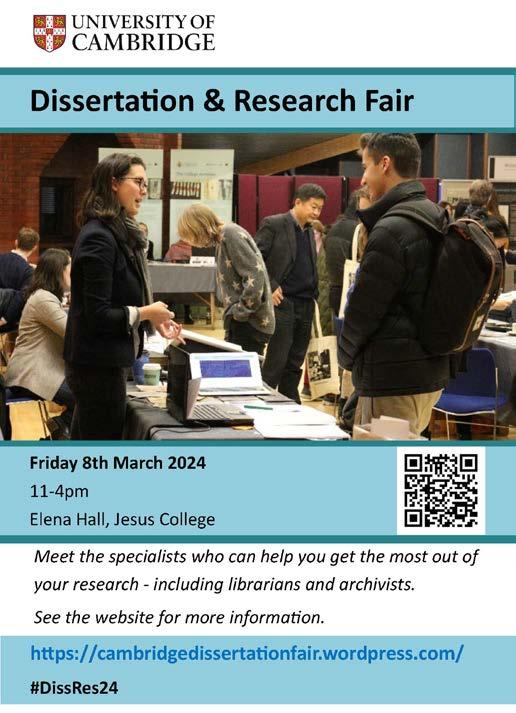
In March, St John’s Archives and Special Collections were represented at the Cambridge Dissertation Fair, a free event designed to bring together students and information professionals. The Fair has a simple concept: staff from a variety of archives, libraries and museums in Cambridge come together to showcase their collections in one space. Visitors can find out more about the repositories represented and what material the archives might hold which is relevant to their own research project.
The Fair was held at Jesus College, in its Elena Hall venue, a nice, light space which was just the right size for the number of participants. Its location meant there wasn’t ‘passing traffic’, so the Committee (which the Archivist joined this year) is going to consider alternatives for next year’s Fair. There is no budget for the event and we are reliant on the generosity of Colleges and the University for use of their space (with tables, power points, wifi, etc).
Feedback showed that visitors particularly welcomed the ‘ask an academic’ table, at which Fellows who kindly agreed to spend part of their day at the Fair engaged with students who had questions about how they use archives in their research.
It was lovely to meet students visiting the Fair, to find out about their research topics and help where we could. It was also great to spend time with fellow professionals, and importantly, to pinch some of their ideas for next year’s stall – the Archivist is determined that next year we will have a rummage box (and a patterned tablecloth)!
Sing like a bee (or a bat, if you prefer)
One of the things I was most excited about when applying for this Graduate Trainee job was the opportunity to put together my own exhibition using material from the Old Library and Special Collections.
After browsing the Library website and RISM (an online music catalogue which lists some of our musical scores), I eventually settled on the theme of ‘Music and Science’. This is a particular area of interest for me, having taken Maths, Further Maths, Physics and Music at AS and A level, and some sciencerelated papers during my music degree, so I was especially keen both to share some of my existing knowledge on the subject and to learn more through my research.
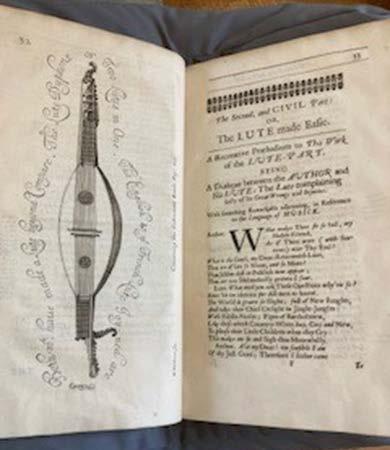
Out of everything I’m exhibiting, I think I am most excited about the Policronicon (1495), which features the first musical notation printed in England. Other highlights include The Feminine Monarchy, or The History of Bees (1634), in which the author Charles Butler transcribed the sound of the Queen Bee into musical notation and expanded this into a four-part madrigal. I am also exhibiting Robert Fludd’s Temple of Music, found in his work Utriusque cosmi maioris (1617); an example of a four-part motet which can be sung upside down, from Sir John Hawkins’ A General History of the Science and Practice of Music (1776); and two letters sent by John Crook from a Prisoner of War camp Lynsey Darby, Archivist
demonstrating the effect that music had on his mental wellbeing. Musick’s Monument (1676) by Thomas Mace was a surprising find, which I originally thought would be a fairly standard treatise on the art of lute-playing but actually contains some brilliant quotes demonstrating just how much the author loved the lute. I had a lot of fun reading it.
Meet the new Library Assistant
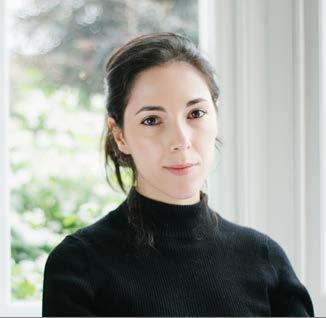
I joined the wonderful team at St John’s College Library at the beginning of May 2024, soon after finishing my MA in Translation and Culture at UCL. I have applied a multidisciplinary approach throughout my experiences, which has expanded my perspectives. Indeed, my passion for libraries and books has been the connecting thread of my journey.
While working as an artist, I volunteered behind the scenes in archives, museums, and libraries. During my MA at UCL, where I
Very Short Introductions online
The exhibition runs from Monday 24 June in the Library Exhibition Area, and will be open Monday to Friday, 9am to 5pm, excluding bank holidays.
Image: Thomas Mace, Musick’s Monument (London : printed by T. Ratcliffe, and N. Thompson, 1676) (Kk.2.5)
Harriet Edwards, Graduate Trainee 2023-24
focused on Poetry and Children’s Literature, I also spent two years volunteering at a wonderful community library in London. There, I found a profound sense of belonging and purpose that made me realise my desire to further my career in librarianship. My interest in library work began during my BA in Photography at the University of the Arts London, where I spent endless hours in the special collections section and all my projects culminated in unique handmade books, where writing and visual elements found a curated balance.
During my studies, I have developed a keen interest in academic libraries. I am eager to advance my skills in cataloguing and classification while enjoying the vibrant sense of community in a collegiate setting. I will soon embark on a second MA in Library and Information Studies to further enhance my contribution to the College Library, where I am focused on processing book donations and enriching our already vast collection. I look forward to meeting you and contributing to St John’s College Library!
Chiara Avagliano, Library Assistant (part time)

The ebooks@cambridge team is constantly expanding the range of ebooks which can be accessed free by Cambridge students and staff. You can now access over 850 of Oxford’s Very Short Introductions titles online. The Very Short Introductions series offers concise introductions to a wide range of subjects. Available titles can be browsed from the Oxford Academic Platform
The subject sidebar menu enables you to filter specific disciplines within core subject areas (Arts and Humanities, Law, Medicine and Health, Science and Mathematics, and Social Sciences). Records for the collection can also be searched and accessed via iDiscover.
If you prefer an audio format, you can subscribe to the Very Short Introductions podcast via your favourite podcast app (e.g. Google Podcasts, SoundCloud, Spotify). You can find out more about ebooks via the Cambridge LibGuides webpages and blog
Janet Chow, Academic Services Librarian
For comments on this issue, and contributions to future issues, please contact Janet Chow. Email: jc614@cam.ac.uk; Tel: (3)38662


 Lynsey Darby, Archivist
Adam Crothers, Special Collections Assistant
Lynsey Darby, Archivist
Adam Crothers, Special Collections Assistant




